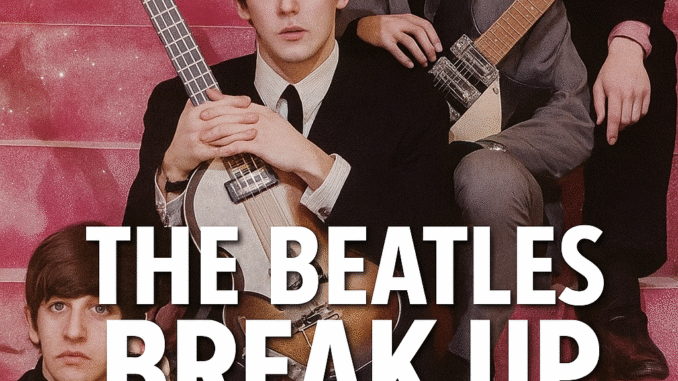
The Beatles Call It Quits: A Legendary Band’s Sudden Split Stuns the World
In a move that has sent shockwaves through the music world, The Beatles—the most famous band in modern history—have announced that they are breaking up🚨. What began as quiet rumors of creative tension has now erupted into a public and painful split, leaving millions of fans stunned and heartbroken.
After years of dominating global charts and redefining popular music, the Fab Four—John Lennon, Paul McCartney, George Harrison, and Ringo Starr—have decided to go their separate ways. For a generation that grew up to the sound of “Hey Jude,” “Let It Be,” and “Yesterday,” the news feels almost impossible to believe.
—
Tensions Behind the Scenes
For months, speculation had been mounting that all was not well within the world’s most beloved band. Insiders close to Apple Corps, the Beatles’ multimedia company, had whispered about growing creative and personal differences among the group.
John Lennon, long regarded as the band’s most rebellious and outspoken member, had been pushing toward a more avant-garde, experimental direction in his music. His relationship and artistic collaboration with Yoko Ono further fueled tensions, with some members feeling that the line between personal life and band business had become blurred.
Paul McCartney, ever the perfectionist and melodic craftsman, was reportedly frustrated by what he saw as a lack of discipline and focus during recording sessions. Sources claim McCartney took on a leadership role during the making of Let It Be and Abbey Road, which didn’t sit well with the others.
George Harrison, once overshadowed by Lennon and McCartney, had also begun asserting himself more strongly as a songwriter. With masterpieces like “Something” and “Here Comes the Sun,” Harrison proved that his musical voice was every bit as compelling as his bandmates’. Yet his growing contributions often met resistance, deepening his dissatisfaction.
Even Ringo Starr, the affable drummer who usually stayed out of disputes, temporarily left the band in 1968 amid growing tension, only to return after a brief hiatus.
—
The Final Straw
The breaking point, it seems, came after months of frustration surrounding the release of Let It Be. The band’s disagreements over mixing, management, and creative control boiled over into open conflict. Each member had a different vision for the band’s future—if it even had one.
Paul McCartney reportedly wanted the Beatles to return to touring and to reclaim the joy of live performance. Lennon, on the other hand, felt the Beatles had said all they needed to say as a group and was eager to explore life as a solo artist alongside Ono. Harrison wanted the freedom to develop his own projects, while Starr hoped for peace between his friends, though even he admitted the tension had become unbearable.
When McCartney issued a statement earlier this week announcing his own solo album and implying the Beatles were finished, the world took it as confirmation of what fans had feared for months: the end of an era.
—
The World Reacts
The reaction has been nothing short of explosive. Radio stations across the globe interrupted programming to deliver the news. Fans gathered outside Apple headquarters in London, some in tears, others refusing to believe the story was true.
“I feel like my whole youth just ended,” said one fan outside the building, clutching a vinyl copy of Sgt. Pepper’s Lonely Hearts Club Band. “They were more than a band—they were the soundtrack to our lives.”
Music journalists have been scrambling to make sense of what this means for the future of popular music. The Beatles were not just a cultural phenomenon; they were innovators who transformed rock into art. They elevated the idea of the album as a cohesive artistic statement, influenced countless musicians, and even reshaped fashion and social attitudes.
“This is the day music grew up,” said one critic somberly. “But it’s also the day a dream ended.”
—
What Comes Next for the Fab Four
Though the Beatles’ journey as a band seems over, all four members appear determined to continue making music. Lennon and Ono have already been collaborating on a series of experimental and politically charged projects. McCartney, whose solo debut McCartney features intimate, home-recorded songs, seems eager to chart his own course. Harrison, too, has a stockpile of unreleased songs that could fill several albums, while Starr has hinted at exploring film and music projects on his own.
Still, the question remains—will they ever play together again? While none of the members have completely ruled it out, the mood among insiders is grim. “They love each other like brothers,” said one close associate, “but they’ve grown in different directions. Sometimes love just isn’t enough to hold something this big together.”
—
The End of an Era
For fans, it’s difficult to imagine a world without the Beatles. Their story—from the smoky clubs of Liverpool and Hamburg to the world’s grandest stages—feels like modern mythology. They transformed from a cheerful boy band singing “She Loves You” to the psychedelic pioneers behind Revolver and Sgt. Pepper, pushing the limits of what pop music could be.
Now, as the Beatles dissolve, so too does a piece of the 1960s spirit. The band embodied the decade’s ideals of creativity, experimentation, and boundless optimism. Their breakup, for many, symbolizes the fading of that dream.
Even so, their legacy is secure. The Beatles changed not just the sound of music, but its meaning. Generations to come will still discover their records and feel that same magic—the harmony, the wit, the innovation, the humanity.
As one heartbroken fan put it: “The Beatles might have ended, but the music never will.”
Leave a Reply